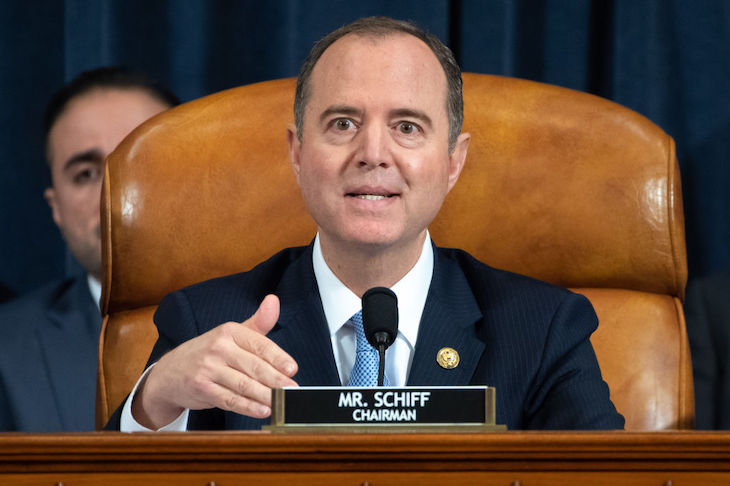The first day of public impeachment hearings was good for Republicans and mediocre, at best, for Democrats. That’s far short of what Democrats need — and they know it. To remove a president, they need clear evidence of serious malfeasance, enough to convince average voters and put pressure on Republicans on Capitol Hill. They did not make a strong start.
Hearsay testimony about diplomatic process is not enough, and that’s all they heard on Day One. Trump’s use of irregular back channels may be irritating to career diplomats; it may be a confusing, incoherent way to run foreign policy; but it is perfectly legal. It’s also too deep in the minutiae of public policy to engage the general public. Persuading them is essential if Democrats are to overturn a popular election and remove a president the voters freely chose.
That does not mean President Trump’s call to Ukraine’s President Zelensky was ‘perfect’ as Trump calls it. It was wrong to mention Joe Biden or Hunter Biden and wrong to have delayed the lethal aid Congress voted to give Ukraine.
But ‘wrong’ does not mean impeachable. The Trump phone call falls short of impeachment for three reasons:
- The aid was never explicitly tied to a clear-cut demand in the Trump-Zelensky call;
- Zelensky never did what Trump hoped for; indeed President Zelensky probably did not know about the delay in aid disbursements until several weeks after the phone call; and
- Ukraine actually received all the aid after a brief delay, even though they did not act on Trump’s request.
These limitations are crucial problems for the Democrats’ case. Unless Chairman Adam Schiff and his allies of the House Intelligence Committee can shake that story, they will find it impossible to sell the episode as a ‘high crime and misdemeanor,’ bribery or treason. They need a lot more hard evidence that implicates the president directly in serious crimes. Without it, they cannot convince the public or wavering Republican office holders. It doesn’t help that the public already worries that the House process is fundamentally unfair and determined to reach a preordained outcome. Impeachment may be a political process, not a legal one, but the public demands fairness.
Trump supporters say he simply wanted an investigation of corruption in a country where it is pandemic. If that were all he sought, there would be no problem. The US has a long-standing goal of stopping corruption, and it has a specific interest in good governance where it provides aid money. The problem is that Trump wanted more. He mentioned the Biden family ties to an (allegedly) corrupt company, Burisma, in a pervasively corrupt sector, energy. He wanted those ties investigated. Since Joe Biden is a 2020 candidate, the President’s request asks a foreign government to involve itself, at least indirectly, in US politics.
That request is inappropriate, even if Hunter Biden was involved with a corrupt company and gave them political cover. It’s inappropriate, even if Vice President Biden demanded the Ukrainians fire a prosecutor who was closing in on Burisma and possibly on Hunter Biden himself. The Ukrainians should investigate that alleged corruption, but not because the US president requests it in connection with a political opponent.
Troubling as Trump’s request was, it falls well short of the Democrats’ claim of ‘extortion’. In fact, this focus on extortion is new. It came only after earlier efforts to pinpoint a specific ‘high crime’ failed to gain traction. Without convincing evidence, though, it’s just hyperbole.
Now that Schiff and House Speaker Nancy Pelosi have begun staging this big impeachment hearing, they need a decisive victory. They cannot claim one from the first day. If Day Two fails them, if it doesn’t draw big viewership, motivate the Democratic base, and begin to convince independents, their whole strategy will begin to implode. The Republicans will pile on, claiming the whole process has trampled the rights of the accused since the president’s lawyers were excluded, Republicans were denied a chance to call their witnesses, and the person who began this latest phase, the anonymous whistleblower, remains hidden, evading cross-examination.
At this point, Speaker Pelosi probably cannot avoid a floor vote, even if the hearings are a dud. She and her caucus are too far down the road to turn back now. But a House vote will come at a high price. It will be devastating to Democrats from districts Trump carried. The only alternative would be for Pelosi to seek only a censure vote. She could have done that earlier, but pulling back now would be a public humiliation, an admission that her party has spent three years drilling a dry hole.
Compounding the Democrats’ problems, the public will look at the opportunity costs of this obsession with Russian collusion and then Ukrainian aid. House Democrats have had little time or enthusiasm for anything else, including such national priorities as the pending trade deal with Canada and Mexico. Trump and the Republicans will exploit that failure and run against a ‘do-nothing’ Congress.
In short, Adam Schiff did House Democrats no favors on the first day of public hearings. The dull proceedings produced little new and nothing compelling. They need a helluva lot more to convince the public they are not on a fool’s errand.
Charles Lipson is the Peter B. Ritzma Professor of Political Science Emeritus at the University of Chicago.
See the full story of The Democrats’ bad start to the impeachment hearings on Spectator USA.
Got something to add? Join the discussion and comment below.
Get 10 issues for just $10
Subscribe to The Spectator Australia today for the next 10 magazine issues, plus full online access, for just $10.






















Comments
Don't miss out
Join the conversation with other Spectator Australia readers. Subscribe to leave a comment.
SUBSCRIBEAlready a subscriber? Log in